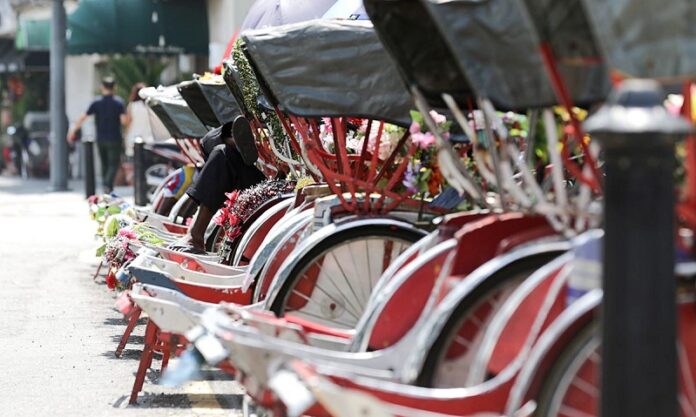
Subscribe to our Telegram channel for the latest updates on news you need to know.
GEORGE TOWN, March 11 — Penang’s iconic trishaws have been “resting” for nearly a year now with most of the riders dependent on food handouts and taking up menial jobs to earn a living.
Since the enforcement of the movement control order (MCO) on March 18 last year and the subsequent closure of international borders, foreign tourist arrivals have come to a halt.
Even domestic tourism activities dwindled to a trickle as interstate travel was prohibited for most parts of the year.
A visit to a popular trishaw pit stop near Cititel Hotel at Jalan Penang here showed rows of trishaws left idle while the riders languished under the shade of a nearby building waiting for food handouts from government agencies, charity organisations and generous individuals.
One of the trishaw riders Tan Kang Ho, 71, told Bernama there have been no requests for their services since the first nationwide MCO took effect on March 18 last year.
Tan, who has been a trishaw rider for almost 30 years, said prior to the Covid-19 pandemic, he used to make around RM50 a day ferrying domestic tourists. And, he would consider himself lucky if he could get some foreign tourists to ride on his trishaw as it enabled him to earn an extra few hundred ringgit.
“But here we are now sitting by our trishaws and waiting for people to distribute a meal box to us to enable us to go through the day. This past one year, it is only us, the riders, who have been sitting in our trishaws,” he lamented.
Fleet leader
Tan said his trishaw used to be part of a “fleet” of trishaws that were led by a fellow rider, who went by the nickname Ah Aw, who would notify them if any international tourist groups or cruise liners arrived in Penang.
According to Tan, Ah Aw was the only trishaw rider who owned a mobile phone and that he would be the one to contact should anyone need trishaw services.
“Following the MCO, he has not been receiving any phone call for our services,” he added.
Another trishaw rider Ang Chee Guan, 63, said some of the riders have been working as security guards or taken up other jobs to earn an income and would only ride their trishaws if their services are needed.
For Tan and Ang, their trishaws are not only their source of livelihood but also serve as their home.
“I don’t have my own family, I don’t have a house I have been sleeping in my trishaw for the past five years,” Ang said.
He also said his trishaw was actually a rented one, with the rent being RM60 a month.
“Because of the current situation, my ‘landlord’ was considerate enough to waive the rental,” he added.
Free meals
At another trishaw pit stop located within Penang’s core heritage zone, the atmosphere was equally gloomy – rows of trishaws can be seen standing idle with their riders hoping for the good times to return.
Trishaw rider Manan Talib, 56, said he used to ferry a number of tourists, including domestic tourists from Kedah, Johor and Kuala Lumpur, who wished to go on a tour of the heritage sites.
Now all he can do is hope for the travel restrictions to be lifted soon so that he can earn an income.
The trishaw riders in this particular pit stop get free meals daily, thanks to a kind-hearted restaurant owner who only wanted to be identified as Mr Sim.
Having realised the plight of the trishaw riders, Sim, 48, has been offering them home-cooked meals daily.
“The best I can do for them is to provide them one proper meal a day in the hope that our iconic trishaws would not disappear in the near future,” he said.
Other groups such as the Malaysian Cooperative Societies Commission have also been distributing food to the trishaw riders. — Bernama


